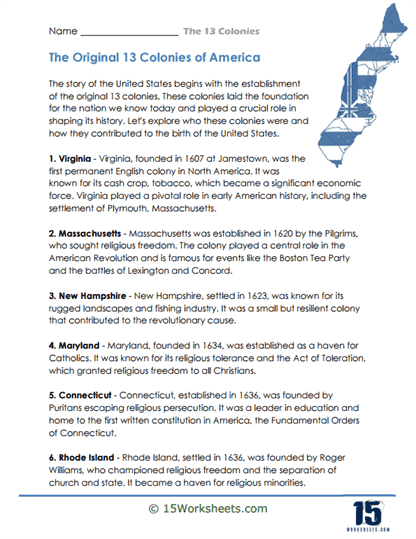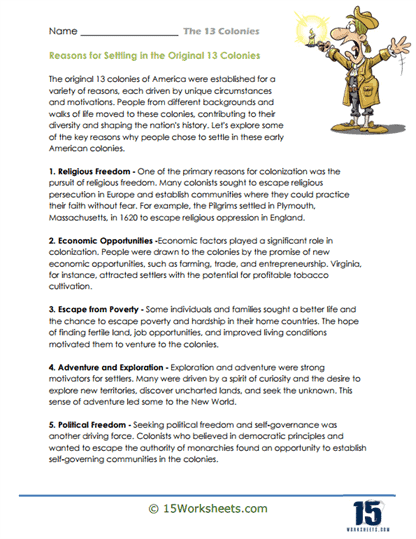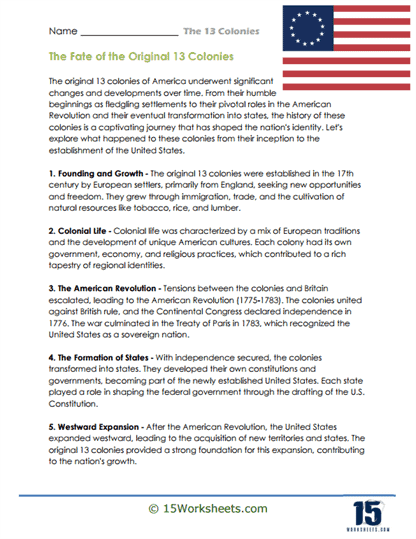13 Colonies Worksheets
About These 15 Worksheets
The 13 American Colonies Worksheets are designed to enhance the learning experience of students studying the early history of the United States. These worksheets focus on the period when the thirteen original colonies in North America were established and governed by the British. The content and activities included in these worksheets are diverse, aimed at engaging students in a variety of learning styles and helping them understand the historical significance of this era, its influence on modern world history, and its impact on contemporary society.
Types of Available Exercises
Map Labeling and Analysis – These exercises involve identifying and labeling the thirteen colonies on a map. They often include questions about geographical features, colonial boundaries, and the significance of certain locations. This helps students visually understand the physical layout and the geographical context of the colonies.
Timeline Creation – Students are asked to construct timelines that chart key events in the history of the colonies. This exercise aids in understanding the chronological order of events and the cause-and-effect relationships between them.
Reading Comprehension – These worksheets include excerpts from historical documents, letters, or narratives from the colonial period. Students are tasked with reading and interpreting these texts, which helps improve critical reading skills and offers a first-hand look into the period’s perspectives and language.
Fill-in-the-Blanks – These exercises are designed to reinforce specific facts and information about the colonies, such as the names of colonial leaders, dates of important events, or characteristics of different colonies.
Comparative Analysis – Students compare and contrast different colonies. This could involve comparing economies, religious practices, relationships with Native Americans, or forms of government, which fosters a deeper understanding of the diversity within the colonies. Longer written assignments encourage students to explore a topic in depth, such as the causes of a particular conflict, the effects of a certain policy, or the lives of colonial people.
Primary Source Analysis – Students examine and interpret primary sources from the era, such as legislation, speeches, or diaries. This helps develop critical thinking and analytical skills, as students learn to draw conclusions from historical evidence.
The Purpose of These Worksheets
These worksheets play a vital role in enhancing students’ understanding of both world history and the modern world. At their core, these worksheets provide foundational knowledge of American history, crucial for comprehending the formation, early challenges, and evolution of the United States. This grounding in the basics of American history is not just about memorizing dates and events; it’s about understanding the broader narrative of the nation’s genesis.
Delving deeper, these educational tools enable students to contextualize the American colonial experience within the wider tapestry of world history. They illuminate how this period was influenced by and contributed to larger global phenomena such as European colonization and international trade patterns. This broader perspective is essential in understanding how historical events are interconnected across continents and cultures.
The diverse range of exercises in these worksheets fosters critical thinking and analytical skills. Students are not just passive recipients of information; they actively engage with historical evidence, grapple with different viewpoints, and learn to construct well-reasoned arguments. These skills are indispensable for any historical study, enabling students to critically analyze past events and draw meaningful conclusions.
The study of the 13 colonies also offers insights into contemporary issues. By understanding the historical roots of American political, social, and legal systems, students can better comprehend and engage in modern debates surrounding governance, rights, and national identity. This historical perspective provides a deeper understanding of current affairs and the ongoing impact of historical events on today’s world.
Additionally, these worksheets encourage empathy and cultural understanding. As students explore the varied experiences of indigenous peoples, African slaves, and European settlers in the colonies, they gain a more nuanced understanding of different cultural perspectives. This fosters a sense of empathy, an appreciation for diversity, and an understanding of the complex human stories behind historical events.
The global perspective highlighted in these worksheets is crucial. They shed light on the global connections and impacts of colonialism, helping students appreciate the interdependent nature of world history. This understanding is key in recognizing how past events, such as colonialism, have shaped the dynamics that continue to influence the modern world. In summary, the 13 American Colonies Worksheets are not just about learning history; they are about connecting the past with the present and fostering a comprehensive understanding of our world.
What Were The 13 Colonies? Why Were They established?
The 13 Colonies were a group of British colonies located on the eastern coast of North America during the 17th and 18th centuries. They were established by European settlers, primarily from England, who sought various reasons for establishing these colonies. Here’s a brief overview of the 13 Colonies and their reasons for establishment:
Virginia – Established in 1607 at Jamestown, Virginia was the first permanent English settlement in North America. It was primarily founded for economic reasons, with the goal of finding gold and other valuable resources.
Massachusetts – The Massachusetts Bay Colony was founded in 1630 by Puritans seeking religious freedom and the opportunity to establish a “city upon a hill” as a model Christian community.
New Hampshire – Founded in 1623, New Hampshire was established for economic reasons, including fishing, trade, and land speculation.
Maryland – Maryland was founded in 1632 as a haven for English Catholics facing religious persecution. It was named after Queen Henrietta Maria, the wife of King Charles I.
Connecticut – Settled in the 1630s, Connecticut was established by Puritans who sought religious freedom and economic opportunities, including fur trading and farming.
Rhode Island – Founded by Roger Williams in 1636, Rhode Island was established to provide a haven for religious dissidents and to promote religious tolerance and separation of church and state.
Delaware – Originally part of New Sweden, Delaware was later settled by the Dutch and then the English. It was primarily established for trade and agriculture.
North Carolina – Established in 1653, North Carolina was initially settled by people from Virginia and sought agricultural opportunities, including tobacco farming.
South Carolina – Founded in 1670, South Carolina was established for economic purposes, including rice and indigo cultivation, as well as trade.
New York – Originally the Dutch colony of New Netherland, it was taken over by the English in 1664 and renamed New York in honor of the Duke of York. Its establishment had economic motivations, including trade and land speculation.
New Jersey – Originally part of New Netherland, New Jersey was granted to Lord John Berkeley and Sir George Carteret in 1664. It was established for economic reasons and attracted a diverse group of settlers.
Pennsylvania – Founded by William Penn in 1681, Pennsylvania was established as a Quaker colony that promoted religious freedom, tolerance, and good relations with Native Americans.
Georgia – Established in 1733, Georgia was founded as a buffer colony between South Carolina and Spanish Florida. It was also established as a haven for debtors and as a military defense outpost.
These colonies played a significant role in the development of the United States and had diverse motivations, including economic opportunity, religious freedom, and strategic considerations. Over time, they grew and evolved, ultimately contributing to the formation of the United States of America.
Why Did People Relocate To the Colonies?
In the early seventeenth century, several conditions in England “pushed” people toward the North American colonies. These conditions were often referred to as “push factors,” as they encouraged individuals and groups to leave England and seek new opportunities in the American colonies. Some of the key push factors included:
Religious Persecution – Religious tensions and persecution were significant factors that led many English Puritans and other religious dissenters to seek refuge in the American colonies. The Church of England was the established church in England, and those who held different religious beliefs faced discrimination and persecution. Puritans, in particular, sought to escape religious repression and establish communities where they could practice their faith freely. This led to the founding of colonies like Massachusetts and Rhode Island.
Economic Hardships – Economic difficulties, including poverty, unemployment, and lack of opportunities, pushed some individuals and families to consider emigrating to the American colonies in search of a better life. The promise of available land, potential for economic success, and opportunities for trade and entrepreneurship attracted settlers to the colonies.
Political Instability – England experienced periods of political turmoil and instability in the early seventeenth century, including the English Civil War (1642-1651) and the execution of King Charles I in 1649. These events created an uncertain political climate that prompted some people to seek more stable and peaceful environments in the colonies.
Land Enclosure and Displacement – In England, the process of land enclosure, where common lands were enclosed and privatized, led to the displacement of rural populations. Many landless or dispossessed individuals saw the American colonies as a place where they could acquire land and start anew.
Debt and Indentured Servitude – Some individuals who were burdened by debt or facing legal troubles in England chose to become indentured servants in the colonies. In exchange for a period of service, they could receive passage to the New World and the hope of a fresh start.
Adventure and Exploration – For some, the lure of adventure and the spirit of exploration played a role in their decision to emigrate to the colonies. The idea of venturing into the unknown and participating in the colonization of a new continent held a strong appeal.
Escape from Crime and Punishment – Individuals seeking to escape criminal charges or harsh punishments in England sometimes chose to start anew in the American colonies, where they could avoid legal consequences.
These push factors combined to drive significant waves of immigration to the North American colonies during the early seventeenth century. Over time, these settlers and their descendants played a crucial role in shaping the cultural, religious, economic, and political landscape of the colonies, ultimately contributing to the formation of the United States.
What Hardships Did Colonists Experience?
The early colonists in British North America faced a wide range of hardships and challenges as they established their communities and colonies. These hardships were significant and had a profound impact on their lives. Here are some of the main hardships they faced:
Harsh Climate – Many of the early colonies were located in regions with harsh climates. For example, New England colonies like Massachusetts and New Hampshire experienced cold winters with heavy snowfall, while Southern colonies like Virginia and the Carolinas had hot and humid summers. These climate extremes posed challenges for agriculture and daily life.
Food Shortages – The colonists often faced food shortages, especially during their initial years in the New World. They struggled to grow enough crops to feed themselves and relied on subsistence farming. Famines and food scarcity were not uncommon.
Native American Relations – Colonists encountered indigenous peoples who had been living in North America for centuries. Relations with Native American tribes were complex and sometimes led to conflicts, as the colonists sought to establish their own territories and secure resources.
Disease – Diseases, such as smallpox, measles, and influenza, were devastating to the early colonists, who had little immunity to these new diseases. Epidemics swept through their communities, causing significant loss of life.
Isolation and Communication – The colonies were often isolated from one another, making communication and travel difficult. Roads and infrastructure were limited, and transportation by sea was essential. This isolation hindered trade and communication.
Economic Hardships – Many colonists faced economic difficulties, particularly in the early years of settlement. The costs of establishing colonies were high, and profitability took time to achieve. Debt and financial struggles were common.
Political Uncertainty – In the absence of a stable government structure, early colonists often faced political uncertainty. Royal charters and colonial governments were not always well-defined, leading to disputes and conflicts over governance.
Labor Shortages – Labor was in high demand in the colonies, especially for labor-intensive activities like farming and construction. To address labor shortages, indentured servants and enslaved Africans were brought to the colonies, leading to complex social and economic dynamics.
Religious Differences – Religious diversity and tensions were prevalent among the colonists. Different religious groups had settled in various colonies, leading to conflicts over religious practices and beliefs.
Witch Hunts and Trials – The Salem witch trials in the late 17th century (1692-1693) were a dark period in the Massachusetts Bay Colony’s history. Accusations of witchcraft led to trials, imprisonment, and executions of several individuals.
Warfare and Conflicts – The colonies were not immune to warfare and conflicts. The French and Indian War (1754-1763) involved the British colonies and indigenous allies fighting against the French and their Native American allies. These conflicts had a significant impact on the colonies.
Despite these hardships, the early colonists persevered, adapted to their new environment, and gradually established stable communities. Over time, they played a crucial role in the development of what would become the United States of America.


















